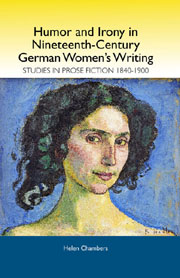Book contents
- Frontmatter
- Contents
- Acknowledgments
- Introduction
- 1 Annette von Droste-Hülshoff and Ida Hahn-Hahn: Overcoming Seriousness?
- 2 Ottilie Wildermuth and Helene Böhlau: Harmless Humor or Subtle Psychology?
- 3 Marie von Ebner-Eschenbach: Satire, Physical Comedy, Irony, and Deeper Meaning
- 4 Ada Christen and Clara Viebig: Laughter and Pain in the World of Work
- 5 Isolde Kurz and Ricarda Huch: The Humor of Skeptical Idealism
- Conclusion
- Works Cited
- Index
4 - Ada Christen and Clara Viebig: Laughter and Pain in the World of Work
Published online by Cambridge University Press: 05 February 2013
- Frontmatter
- Contents
- Acknowledgments
- Introduction
- 1 Annette von Droste-Hülshoff and Ida Hahn-Hahn: Overcoming Seriousness?
- 2 Ottilie Wildermuth and Helene Böhlau: Harmless Humor or Subtle Psychology?
- 3 Marie von Ebner-Eschenbach: Satire, Physical Comedy, Irony, and Deeper Meaning
- 4 Ada Christen and Clara Viebig: Laughter and Pain in the World of Work
- 5 Isolde Kurz and Ricarda Huch: The Humor of Skeptical Idealism
- Conclusion
- Works Cited
- Index
Summary
Ich bitt' Euch, Leut', schreibt ein ordentliches Weibsbild Bücher?
fremde Menschen […] ahnen nicht, […] wieviel Lachen und Schluchzen in die Lüfte scholl
MARIE VON EBNER-ESCHENBACH DID NOT write the novel of Viennese society that Paul Heyse hoped for, but Ada Christen did represent a different section of society in Vienna for the first time, namely, its suburban poor during the 1850s, in collections of sketches and stories in the 1870s and 1880s and in her novel Jungfer Mutter: Eine Wiener Vorstadtgeschichte (1892). This reorientation of the conventional view such as we have already seen in Wildermuth's tales of modest lives in the provinces or in Böhlau's Ratsmädelgeschichten looks back to the author's childhood experiences of the world of work at the margins of economic viability around the middle of the nineteenth-century. New too in Christen's literary voice is the direct expression of female sexuality in poems whose publication caused a scandal. Her works raise questions about identity and social and psychological determination frequently by exploring in retrospect the mistaken or unanticipated paths that individual lives have taken.
Ada Christen was born Christiane Frideriks into middle-class circumstances in Vienna but the family was reduced to poverty when her father died soon after his release from imprisonment for his part in the 1848 uprisings. Christen had a minimal education and earned her keep sewing gloves as a child, before becoming an actress at fifteen and appearing in supporting roles in the Meidlinger Theater.
- Type
- Chapter
- Information
- Humor and Irony in Nineteenth-Century German Women's WritingStudies in Prose Fiction, 1840–1900, pp. 125 - 154Publisher: Boydell & BrewerPrint publication year: 2007



